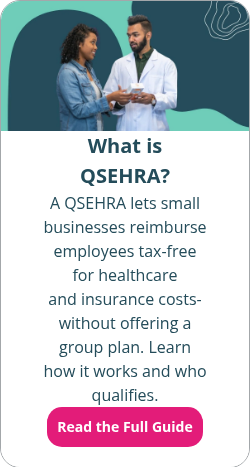Do small businesses have to offer health insurance?
By Elizabeth Walker on November 14, 2025 at 11:00 AM
Most non-elderly people in the U.S. get health coverage through their employer. According to KFF, about 154 million people younger than 65 had employer-provided health insurance in 20251. But are their employers providing it out of choice or necessity?
The Affordable Care Act (ACA) requires applicable large employers (ALEs) to adhere to the employer mandate. This means they must offer affordable health benefits that provide minimum essential coverage (MEC) and minimum value to at least 95% of full-time employees and their dependents. If they don’t, the IRS may assess a tax penalty. However, smaller businesses aren't under such obligations to provide health benefits to their staff.
This article will go over the health insurance requirements for U.S. employers and the various options for coverage.
In this blog post, you'll learn:
- Why small businesses with fewer than 50 FTEs don’t have to offer health insurance.
- The benefits of offering your employees health insurance coverage.
- The different health insurance options available to small employers.
What is an applicable large employer (ALE)?
An ALE is any company or nonprofit organization with at least 50 full-time equivalent employees (FTEs). According to the ACA, a full-time employee is someone who works at least 30 hours per week or 130 hours per month. But, when calculating ALE status, you must also include the full-time equivalent of part-time hours.
You determine your company’s ALE status based on the previous calendar year. For example, you could be an ALE in one year but not the following year if you lost some employees in the last year. Typically, if you have a monthly average of at least 50 FTEs during a calendar year, the federal government will consider you an ALE for the following calendar year.
Your organization doesn't qualify as an ALE if:
- On average, you employed fewer than 50 full-time employees during the previous calendar year.
- You employed more than 50 full-time employees for no more than 120 days during the previous calendar year because you had a seasonal workforce.
Due to the employer mandate, ALEs must provide health coverage to at least 95% of full-time employees and their dependents. If they don’t, and at least one full-time employee buys subsidized coverage, they must pay the Section 4980H(a) penalty, which is a monthly payment of $278.33 (or $3,340/year) per full-time employee in 20262. This penalty applies to every full-time worker, minus the first 30.
If an ALE doesn’t offer minimum value or affordable coverage, the monthly Section 4980H(b) penalty is $417.50 (or $5,010/year) per employee.
Calculating full-time and part-time employees
To see if your company is an ALE, count all full-time employees and the full-time equivalent of part-time workers.
For the majority of organizations, the calculations are simple:
- Full-time employees: These individuals work an average of at least 30 hours per week or 130 hours per month. You'll need to count up all your full-time employees.
- Full-time equivalents: To calculate the full-time equivalent of all your part-time workers, add the total number of hours worked by part-time employees in a given month (up to but not including 120 hours per employee). Then divide the total by 120 (not 130)3.
If you reach 50 or more employees in your calculations, your business is an ALE, and you’re required to offer health insurance benefits under the ACA.
Small business health insurance requirements
The ACA states that small businesses with fewer than 50 FTEs don't have to provide health insurance benefits to their employees. However, that doesn't mean they shouldn't provide health insurance benefits.
Here are some advantages:
- Attracting employees and retaining top talent. In addition to competitive salaries, our 2024 Employee Benefits Survey found that 81% of employees believe an employer's benefits package is an important factor in their decision to accept a job. It also has the potential to increase your employee retention rate.
- Helping your business stand out against the competition. You can create a competitive employee benefits package that sets you apart from other companies in your industry by offering additional financial assistance through reimbursements.
- Building a happier and healthier workforce. Having greater access to healthcare also boosts employee productivity and job satisfaction. If employees are healthy and don’t need extended periods of sick leave, your organization can be more effective and profitable. Health benefits will also help your staff feel more satisfied and happier at work.
- Saving more money during tax season. Depending on the type of plan you offer, you can benefit from tax savings for providing the health plan. Eligible employees can get tax-saving benefits by participating.
In most states, small group health insurance is available to organizations with fewer than 50 employees. You can purchase a small group policy directly from an insurance carrier or through a Small Business Health Options Program (SHOP) exchange. You may also qualify for the small business health care tax credit if you enroll in SHOP marketplace coverage.
In addition to traditional group health insurance, you can consider alternative benefits, such as a health reimbursement arrangement (HRA) or a health stipend.
Health reimbursement arrangements (HRAs)
An HRA is an excellent choice for offering affordable health coverage. It allows employers to set a budget-friendly monthly contribution amount, known as an allowance, that employees can use to buy individual health coverage and other out-of-pocket medical expenses. Then, the employer reimburses employees tax-free up to their allowance limit after they incur an eligible healthcare cost.
HRAs are often a better choice for small businesses than traditional group health insurance because they let employees pick the plan and services that suit them best. They can also save employers money compared to group coverage and offer tax benefits. Plus, HRAs have no minimum participation requirements, so they’re easier for small business employers to offer.
With the qualified small employer HRA (QSEHRA) and the individual coverage HRA (ICHRA), employees get tax-free reimbursements for eligible expenses, including:
- Monthly premiums for health, vision, and dental coverage
- Doctor's visits
- Prescription drugs
- Over-the-counter medication
- Chiropractic care
- Mental health counseling
- Preventive services
The QSEHRA is a great option that’s specifically for small employers. However, suppose your company eventually grows to the size of an ALE. In that case, you can switch to an ICHRA and design your benefit with an affordable allowance to satisfy the employer mandate’s requirements.
Health stipends
Your small business can also provide employees with money for health insurance and out-of-pocket medical expenses through a health stipend. Employee stipends work similarly to an HRA, but they have fewer regulations and restrictions.
For example, international workers and 1099 contractors can compliantly participate in the benefit. Stipends also have no eligibility requirements or contribution limits. This enables organizations of all sizes to design a fully customizable health benefit that best suits their needs.
However, unlike an HRA, employers can’t ask for proof of insurance or receipts for their expenses. They also don’t comply with the employer mandate. So, if you have 50 or more FTEs, you can’t offer a stipend instead of an ICHRA or a group plan.
How do HRAs and health stipends compare?
HRAs and health stipends allow your employees to buy their own individual healthcare coverage. Employees can get coverage from a state-based or federal Health Insurance Marketplace, directly from an insurance carrier, or from a licensed broker. Employees can then request a reimbursement for their monthly premiums (or, in the case of a stipend, receive the funds upfront to use on medical expenses). This allows your employees to select the individual health plans that work best for them.
Taxability is the most significant difference between an HRA and a health stipend. While HRAs are tax-free for employers and employees, as long as their health plan provides MEC, health stipends are taxable. If you decide to offer a health stipend, your small business must pay payroll taxes on the amount. Employees will have to pay income taxes on the amount received.
This makes HRAs a better option for most organizations. However, health stipends are an excellent option for organizations with employees who receive a premium tax credit, as a health stipend doesn't impact subsidy eligibility.
Affordable health insurance coverage options for employees of small businesses
If you're not an ALE and aren't offering employer-sponsored group coverage, your employees can buy an individual health plan. To help them with their premiums, you can set them up with an HRA. Then, they can use their HRA funds toward their health insurance premiums and other qualified medical costs.
Individuals who want to buy their own health insurance policy can apply for coverage through a public or private exchange. Remember, the annual Open Enrollment Period is the only time most individuals and families can sign up for a new health plan.
However, there is some wiggle room when it comes to the Open Enrollment Period. Suppose an employee experiences a qualifying life event, such as:
- Losing their current health coverage
- Being offered a QSEHRA or ICHRA
- Getting married or divorced
- Having a baby
- Changing their residence
In that case, they’ll generally qualify for a 60-day special enrollment period to change or enroll in new coverage.
If you partner with PeopleKeep to administer your QSEHRA or ICHRA, your employees can shop for health insurance right from their user-friendly dashboard.
If you’re an ALE with greater compliance needs, our parent company, Remodel Health, and its ICHRA+® administrative solution provide full-service support and guided health insurance shopping assistance for employees.
Conclusion
For many small businesses, keeping up with the rules and regulations surrounding employee health benefits can be challenging. While larger employers with 50 or more FTEs must offer health insurance or potentially face a penalty, smaller companies don’t have to do so. However, offering health benefits is one of the best investments small business leaders can make.
If you're worried about the cost of health coverage, consider a budget-friendly solution like an HRA. Interested in learning more about how a personalized can help your organization? Book a call with one of our HRA specialists today!
This blog article was originally published on November 10, 2020. It was last updated on November 14, 2025.
1. 2025 Employer Health Benefits Survey
2. IRS Revenue Procedure 2024-14
3. IRS - Questions and answers on employer shared responsibility provisions under the ACA
Check out more resources
See these related articles

What is the Small Business Health Options Program (SHOP) Marketplace?
Learn what the Small Business Options Program (SHOP) Marketplace is and how it provides affordable health insurance options for small businesses.

Small group health insurance for beginners
Explore the basics of small group health insurance. Learn how it works, who qualifies, and how to choose the best plan for your small business.

The top 3 health benefit options for small businesses with one employee
Discover the top 3 health benefit options for small businesses with one employee. Learn how to provide affordable and flexible health coverage.



